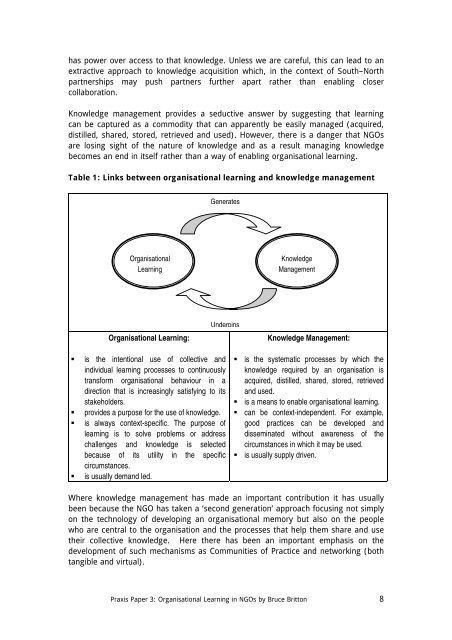Organisational Learning Discussion Paper - Are you looking for one ...
Organisational Learning Discussion Paper - Are you looking for one ...
Organisational Learning Discussion Paper - Are you looking for one ...
Create successful ePaper yourself
Turn your PDF publications into a flip-book with our unique Google optimized e-Paper software.
has power over access to that knowledge. Unless we are careful, this can lead to an<br />
extractive approach to knowledge acquisition which, in the context of South–North<br />
partnerships may push partners further apart rather than enabling closer<br />
collaboration.<br />
Knowledge management provides a seductive answer by suggesting that learning<br />
can be captured as a commodity that can apparently be easily managed (acquired,<br />
distilled, shared, stored, retrieved and used). However, there is a danger that NGOs<br />
are losing sight of the nature of knowledge and as a result managing knowledge<br />
becomes an end in itself rather than a way of enabling organisational learning.<br />
Table 1: Links between organisational learning and knowledge management<br />
<strong>Organisational</strong><br />
<strong>Learning</strong><br />
Generates<br />
Underpins<br />
Knowledge<br />
Management<br />
<strong>Organisational</strong> <strong>Learning</strong>: Knowledge Management:<br />
is the intentional use of collective and<br />
individual learning processes to continuously<br />
trans<strong>for</strong>m organisational behaviour in a<br />
direction that is increasingly satisfying to its<br />
stakeholders.<br />
provides a purpose <strong>for</strong> the use of knowledge.<br />
is always context-specific. The purpose of<br />
learning is to solve problems or address<br />
challenges and knowledge is selected<br />
because of its utility in the specific<br />
circumstances.<br />
is usually demand led.<br />
is the systematic processes by which the<br />
knowledge required by an organisation is<br />
acquired, distilled, shared, stored, retrieved<br />
and used.<br />
is a means to enable organisational learning.<br />
can be context-independent. For example,<br />
good practices can be developed and<br />
disseminated without awareness of the<br />
circumstances in which it may be used.<br />
is usually supply driven.<br />
Where knowledge management has made an important contribution it has usually<br />
been because the NGO has taken a ‘second generation’ approach focusing not simply<br />
on the technology of developing an organisational memory but also on the people<br />
who are central to the organisation and the processes that help them share and use<br />
their collective knowledge. Here there has been an important emphasis on the<br />
development of such mechanisms as Communities of Practice and networking (both<br />
tangible and virtual).<br />
Praxis <strong>Paper</strong> 3: <strong>Organisational</strong> <strong>Learning</strong> in NGOs by Bruce Britton 8
















![CynefinFramework final [Read-Only]](https://img.yumpu.com/19017304/1/190x135/cynefinframework-final-read-only.jpg?quality=85)